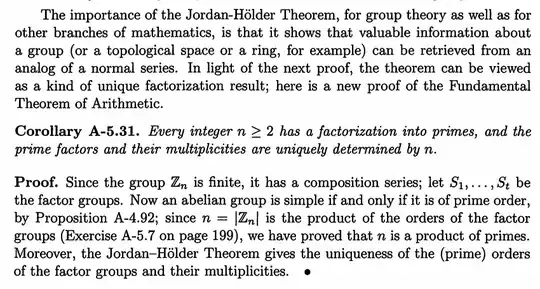Theorem $7$ (Decomposition into prime factors). Let $\mathfrak{P}$ denote the set of prime numbers and $a$ be a strictly positive integer. There exists one and only one family $(\nu_{p}(a))_{p\in\mathfrak{P}}$ of integers $>0$ such that the set of $p\in\mathfrak{P}$ with $\nu_{p}(a)\ne 0$ is finite and $$a=\prod_{p\in\mathfrak{p}} p^{\nu_{p}(a)}.$$
Bourbaki Algebra p.51
Bourbaki says:
...for every family $(\nu_{p}(a))_{p\in\mathfrak{P}}$ satisfying the conditions of Theorem $7$ $\nu_{p}(a)$ is, for all $p\in\mathfrak{P}$, equal to the number of factors of a Jordan-Holder series of $\mathbb{Z}/a\mathbb{Z}$ isomorphic to $\mathbb{Z}/p\mathbb{Z}$. The uniqueness of the family $(\nu_{p}(a))_{p\in\mathfrak{P}}$ therefore follows from the Jordan-Holder theorem.
Can someone please help me understand why this is so? Why does uniqueness follow from Jordan-Holder theorem?
Edit:
A Jordan-Holder series of a group with operators $G$ is a strictly decreasing composition series $\Sigma$ such that there exists no strictly decreasing composition series distinct from $\Sigma$ and finer than $\Sigma$.
Theorem $6$ (Jordan-Holder). Two Jordan-Holder series of a group with operators are equivalent.
